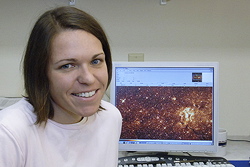Mapping the Milky Way
Astronomy student leads search for new stars

It may be hard to imagine stargazing under the glare of Boston’s city lights, but a Boston University graduate student recently led a team of astronomers in the discovery of nearly 100 new star clusters in the Milky Way, each with up to hundreds of never-before-seen stars.
Emily Mercer (GRS’07), in her fifth year as a doctoral student in astronomy, discovered the majority of the new stars using a computer program she created. The program sifted through more than a year’s worth of data from NASA’s Spitzer space telescope and identified the patterns that indicate the existence of star clusters. Her work was featured in the December 10 issue of the Astrophysical Journal.
“It took about a year or so of fine-tuning to make sure the method worked,” says Mercer, adding that it took her computer about two weeks to crunch all the numbers. “I was pretty excited to see the results.”
Along with Dan Clemens and James Jackson, both College of Arts and Sciences astronomy professors, Mercer represents the University on the multi-institutional Galactic Legacy Infrared Mid-Plane Survey Extraordinaire (GLIMPSE) team, which is using data from Spitzer to create a census and map of the star clusters, where the galaxy’s new stars are born.
From the darkness of space, Spitzer uses infrared light to penetrate the clouds of dust and gas that fill the Milky Way and obscure stars from view. More than 30 million stars have already been catalogued by GLIMPSE, and Mercer’s computer algorithm was able to find about 60 new clusters among them. About 30 more clusters were identified in the traditional way — visually scrutinizing Spitzer’s images for dense areas of stars.
While the GLIMPSE team hopes eventually to catalogue 50 million stars, they have collected all the data they plan to from Spitzer, which launched in 2003 and will shut down in 2008, after it runs out of the liquid helium used to cool its instruments. The star catalogues are public and available for research by other astronomers.
Now that her algorithm has helped locate all this new galactic glitter, Mercer says the GLIMPSE team will map the star clusters to “better understand the structure of our galaxy.” Because our solar system sits within the Milky Way’s flat, spiral disk, Clemens explains, our normal view of the galaxy is “edge on,” making it appear like a blurry band of light stretching across the sky.
“We’d like to untangle that line of sight,” he says. “We hope to place these star clusters in a three-dimensional context within the galaxy.”